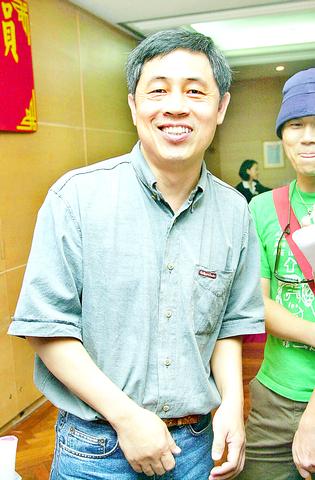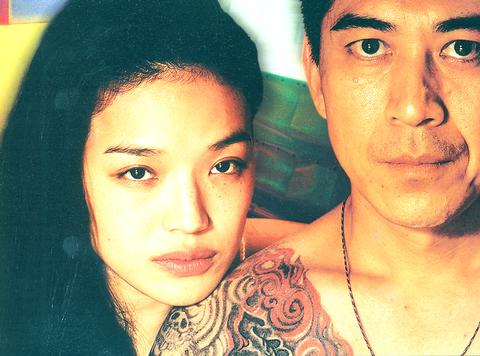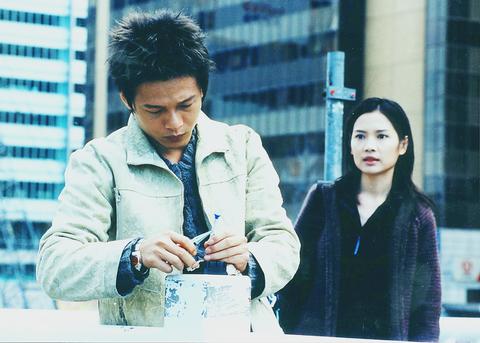A few years ago at an international film festival, Taiwanese director Wu Nien-jen (吳
Does the word `tu duu chih' mean `sound editing' in your language? The word is always seen at the credit roll."

PHOTO : WEI CHIA-CHIH, TAIPEI TIMES
Wu said that this was the name of a person -- it just happened that this person was virtually synonymous with sound editing in Taiwan.

PHOTO: FORTISSIMO
The man referred to was Tu Duu-chih (杜
This year at Cannes, Tu received the technical award for sound editing work on Millennium Mambo (千

PHOTO: HOME GREEN
"He has deserved the award for a long time now," said Hou, who directedMillennium Mambo.

PHOTO: CMPC
According to Hsiao Ya-chuan (蕭
A number of scenes in The Flowers of Shanghai centered on characters eating and drinking round a table. When the shot began, Hou would usually just say, "Okay, you can start now," and leave the actors to develop a situation through improvisational dialogue. "The recordist wouldn't know which lines spoken by which actor were the important ones," said Hsiao.
"The only thing you could do was to guess, and observe carefully," said Tu. "Sometimes you simply didn't catch anything to record, and the shot has to be made again," he said.
It is Tu's ability to work in the difficult circumstances of a Hou shoot that Hsiao, now a director in his own right, most admires about him. "It takes experience, intuition and courage to deal with that kind of situation," he said. "Having worked with Tu on my first short film, I have brought him in on all my other projects, if possible," Hsiao said.
Tu has always been in strong demand, and has been the sound editor for about 70 percent of Taiwanese films released since the mid-1980s.
One of Tu's major contributions to the Taiwan film industry has been the introduction of synchronized sound. The first such feature film in Taiwan to be shot entirely with sync sound was Hou's The City of Sadness (悲
In the 1970s and before, most Taiwanese films tended to focus on war, martial arts and family romance genres, in which sound was invariably dubbed. Even in the 1980s, when realism gradually became the cinematic mainstream, many films only had partial sync sound due to a shortage of technical personnel.
"Five years before the shooting of City of Sadness, about 20 years ago now, I began to work on the technique of synchronized sound recording," Tu recalled.
"At that time, a group of directors had recently returned from the US, and they gave me a chance to watch and learn during the post production process," Tu said of this period when he was an assistant in Central Motion Picture Corp's (CMPC) sound department.
"In the early days when we were making realist films, the boom poles we used for the mics were the kind of poles that people used to hang their laundry out on. The 32mm cameras we used were also very noisy, so they had to be covered with two to three blankets, so that after a few takes, the cameraman would emerge tired and sweaty," Tu recalled.
Tu's first use of sync sound was in a government project in conjunction with Edward Yang.
"The company assigned us a 16mm short film to promote a certain government policy. This was a great time to try the new technique [sync sound] -- even though we had to spend our own money to buy equipment."
After the success of City of Sadness, Hou bought a brand new set of sync recording equipment for Tu. "Hou thought the film was making money, and when he discovered there were bills still to pay, he'd already bought the equipment. So he had to take out loans to buy me the equipment, and I am still thankful for this."
With this new equipment, Tu began to work on more films using synchronized sound, taking the first steps to introducing this technique throughout the industry. "Now, only a couple of short films each year may not use sync sound," Tu said.
As a young man, Tu said, he loved stereos and so he looked for a job that dealt with the sound part of movies. "But later, I became fascinated by the use of sound in a movie context. This was when I fell in love with films, and the films of Hou Hsiao-hsien and Edward Yang in particular. From then on I endeavored to use sound to enhance the meanings they sought to express in their movies," Tu said.
Such is his commitment to cinema that even his memory is pegged to film. "I don't remember in what year my son was born. But I do remember that it was while I was working on Yang's A day on the Beach (海灘的一天).
Tu now has his own sound editing studio with a staff of eight that handles the sound editing for 90 percent of films made in Hong Kong and Taiwan. He himself is now currently associated with Chen Kuo-fu's (
But after 30 years of experience and a room full of prizes, his studio still failed to qualify for government subsidies supporting the local film industry. The reason is that he is only a studio, not a company.
"That's a bit funny but I don't care much," Tu said. "Doing a good job is more important to me. My greatest happiness is when a director tells me,`You make great sound.' I'm this kind of person."

Many people noticed the flood of pro-China propaganda across a number of venues in recent weeks that looks like a coordinated assault on US Taiwan policy. It does look like an effort intended to influence the US before the meeting between US President Donald Trump and Chinese dictator Xi Jinping (習近平) over the weekend. Jennifer Kavanagh’s piece in the New York Times in September appears to be the opening strike of the current campaign. She followed up last week in the Lowy Interpreter, blaming the US for causing the PRC to escalate in the Philippines and Taiwan, saying that as

This year’s Miss Universe in Thailand has been marred by ugly drama, with allegations of an insult to a beauty queen’s intellect, a walkout by pageant contestants and a tearful tantrum by the host. More than 120 women from across the world have gathered in Thailand, vying to be crowned Miss Universe in a contest considered one of the “big four” of global beauty pageants. But the runup has been dominated by the off-stage antics of the coiffed contestants and their Thai hosts, escalating into a feminist firestorm drawing the attention of Mexico’s president. On Tuesday, Mexican delegate Fatima Bosch staged a

Taiwan can often feel woefully behind on global trends, from fashion to food, and influences can sometimes feel like the last on the metaphorical bandwagon. In the West, suddenly every burger is being smashed and honey has become “hot” and we’re all drinking orange wine. But it took a good while for a smash burger in Taipei to come across my radar. For the uninitiated, a smash burger is, well, a normal burger patty but smashed flat. Originally, I didn’t understand. Surely the best part of a burger is the thick patty with all the juiciness of the beef, the

Would you eat lab-grown chocolate? I requested a sample from California Cultured, a Sacramento-based company. Its chocolate, not yet commercially available, is made with techniques that have previously been used to synthesize other bioactive products like certain plant-derived pharmaceuticals for commercial sale. A few days later, it arrives. The morsel, barely bigger than a coffee bean, is supposed to be the flavor equivalent of a 70 percent to 80 percent dark chocolate. I tear open its sealed packet and a chocolatey aroma escapes — so far, so good. I pop it in my mouth. Slightly waxy and distinctly bitter, it boasts those bright,